Great AAR! I've read it atleast 3 times now over the years, always a good read.
- 1
Great AAR! I've read it atleast 3 times now over the years, always a good read.
Dear Readers - If anyone is still tracking this old work I wanted to post an update. Especially since dozens of readers from this work had encouraged me in my writing, and had inquired about my IRL fiction writing.
In fact, in the foreword to my novel I credit this AAR and the Paradox Forums and the readers here as my inspiration for writing it in the first place. My finishing this whole massive AAR in two years time, with all of your encouragement, proved to me that I could write a novel-length story and that people would want to read it.
There's absolutely no substitute for support like that!
Some big news!
I have finally republished my original epic fantasy novel on Amazon. I can't post a link here, but my writing blog is linked in my profile and anyone could go search for Edwin Hanks Author or my novel called Uprooted on Amazon. It has NEW cover art (kind of embarrassed about the old art!) and I'm very proud of that, and the writing in the book. I'm working on getting the novel up on Barnes & Noble also, for the Nook app.
Thank you!
Rensslaer
In other matters, to help maintain world trade and an empire, von Kauperke felt Prussia would also need well-selected provisioning stations. He maintained a number of adventurous (and avaricious) friends who might have the initiative and drive to erect trading posts in far off lands. He also knew that he could convince any of several prominent members of the Lutheran Church to send missionaries abroad. While these efforts might not pay off on the short term, he knew that eventually those contacts and outposts could be incorporated into a Prussian colonial empire.
Wishing to be able to get moving right away, von Kauperke arranged a deal with the Austrian Empire, where some Prussian financial experts would assist them in reworking some of their fiscal arrangements. The sums provided by this deal were to enable Prussia to accelerate the building of some factories, and the cash flow thus supported also managed to finance some Lutheran expeditions to Ifni (where von Kauperke hoped to eventually gain access to some nearby iron mines), Samoa (where sulphur can be mined), Kameroon (coffee and timber) and Namibia (iron and timber).
Also in those busy first days of von Kauperke’s administration, the foreign office was kept busy dealing with the aftermath of the Dutch civil war. While France and Britain both signed the London Treaty, recognizing the independence of the rebellious provinces now called Belgium, von Kauperke chose to cultivate relations with the Kingdom of the Netherlands instead. Prussia rebuffed Belgium, as did Austria.
Von Kauperke’s first year saw the redress of many things that had long since frustrated he and Ludwig. There was an expanded effort to make harvesting and mining more effective and efficient across all of Prussia, with concentration on key industries such as timber, coal and iron. Capitalists were engaged, encouraged and subsidized when necessary to complete or expand factories. And a railway expert was found to establish a bureau for the creation of a Prussian rail network. Kristoff Freylingen had studied the English rail system, and had often suggested improvements and expansions to the King, which had mostly gone unheeded. Now the attitude of the court changed. While Freylingen was excited to have been given the opportunity to build his “toy trains” for the pleasure of the King and Kingdom, his eager efforts over many years were to be dampened by the constant crisis of funding endemic to the Prussian Kingdom during this decade and the next. Indeed, he designed vast mileages of track that linked each section of the Kingdom internally between most major cities. But he was never able to build as extensively, or as rapidly as he always hoped. His first task was to extend a railway from Berlin to Stettin.
During this period, relations with Prussia’s German allies were strengthened wherever possible. Overtures were made to the United Kingdom, though no particular success could be noted. And relations with the Netherlands were improved. On May 7th, 1837, Prussia entered a military alliance with the Kingdom of Sweden.
Those Rensselaers sure do get around, don't they?
Anonymous4401 "Those Rensselaers sure do get around, don't they?"
They're worse than the Habsburgs. And the Napoleans, lol.
Haha, indeed! I did restart from scratch, reading this!Ha! From page 33 - you're re-reading, aren't you?
I'm actually re-reading it also, and taking notes. I am back on my "publish Fire Warms the Northern Lands as a novel" push!
So what's going on, for @RisKFactoR's benefit and that of anyone else who's watching still (anyone??)...
In order to do this right I'm going to expand the story to start it during the Napoleonic Wars. That's when Kaiser-to-be Wilhelm I was a young lad (born 1796) and he's growing up during the chaos of these wars across Europe. Prussia is defeated and made a subject state for a period of time, and then, around the time Wilhelm was 16, the Prussians rise up in the wake of Napoleon's defeat in Russia. Prussia becomes a key player in the final years of the struggle, and Wilhelm is a young officer. Napoleon is defeated, and exiled, but then returns and they have a do-over. Wilhelm is again in combat. Then gets to witness the Treaty of Paris that reshapes Europe. Quite an interesting time to be a young man, I would imagine.
So anyway, I'm researching the Napoleonic Wars currently. In college I had an awesome European History professor who was fascinated with Napoleon. And we went over his life and the battles, but I was more interested in American History and World War II at the time, so I never really picked up his interest. I'm sorry about that - this is interesting stuff, and I wish I'd had the time to discuss this stuff with him in detail back then. I know I would have learned alot, and he would have had fun telling me about it. This is the same professor who passed a French Chassebot and a Prussian Needle Gun (early breech-loading rifles) around the class so we could feel and touch them. He would have loved having a guy like me to talk to, but I missed my chance.
Anyway.... This is underway. I cannot promise it's near on the horizon, but I'm working, and we'll see how far I can get with the project. Enough sprints like this and I'll have a novel written. Just you see.
Thanks everybody!
Rensslaer
I shall forestall your speculation by saying that this is a three-part tour, and it has lots more to do with other things than what you're thinking!
(EDIT: most notably NOT a three-hour tour -- those are always dangerous, and often cause much more trouble than they're worth!!! though they can be entertaining for the viewers...)
In partial answer, I will say that the symbolism is mainly to highlight Prussia's #1 status as a prestigious world power -- vanity on display. And to point out that Prussia's colonies are finally protected by a capable navy, for the first time in history! But that's not really the most significant part of what's going on...
I have the other parts mostly ready, but will space them out because I have virtually nothing after that done!
VILenin, yes, the Russians were in the place of honor because they were primarily responsible for the development of Prussia's modern navy. Tech trades with Russia (+194 relations) got our navy caught up to where it needed to be. Which will be a point of some irony, very soon...
Catknight and Vincent, yes Krakow is in an exalted place! They should be very glad no one ever pays attention to them.
Thank you all for your attention! More specific feedback later, once things begin to develop to where I'm not giving things away...
Rensslaer
Ahh, Wally becomes as much a despot as his ancestors
Let's hope he can limit himself to but a single newspaper, hopefully because after that he will be firmly in charge. A civil war where all the free press gets burned is bad, IMO
@RisKFactoR you're right. The British would make station calls with Royal Navy task forces also. It's a "big navy" thing to do to show off.
And at the rate you're reading you've probably realized that's the beginning of the end for Kaiser Friedrich III.
I'm actually rereading at the death of Kaiser Wilhelm I, where Friedrich III becomes Kaiser.
Thanks for rereading! Glad you're enjoying it.
Rensslaer
Oh, I very much am! I'm even readin all the other comments in between as well lol.
Selected Excerpts from Captain of My Heart: A TransAtlantic Romance, by Camelia Gardner, Pub. 2003
Nov 1, 1903
Dear Wally,
To my Prince, Captain of my Heart, I miss you so. It has been so long, since the summer, when we last saw each other. I think of you every day, dream of you every night. Wish for your kisses, and sleep with your letters.
It sounds like you have settled in to being a wonderful Kaiser! I hope your people appreciate you. I know they must.
With All My Love,
Betsie
Nov 6, 1903
Dear Betsie,
Your letters are an ever-present comfort to me, as I still struggle with the Reichstag, and even my own ministers! I feel like a Montana bronco buster, like those your President Roosevelt told us about! I’m always riding high, but having to hold on tight to keep from being thrown in the dust.
Your Enduring Protector,
Wally
Nov 15, 1903
Oh, Wally! I heard in the news today that you are going to war again! Well, perhaps not you, but Germany. You won’t go to war yourself, will you? Yes, I suppose you will, won’t you! You’re too much a man to send someone to do something you wouldn’t do yourself. But I do hope you will take care of yourself, wherever you are! Don’t let anybody at home take advantage! And be safe. You will be in my prayers, every day, seven times a day – not just twice or thrice, like usual!
With Kisses for My Captain,
Betsie
Nov 16, 1903
My Dearest Prince,
Professor Bradford said today that Germany was just playing as bully, and that one of these days you were going to find someone bigger on the block who would put you down! I spoke out against him, of course, but… I have to admit, Wally, I don’t know exactly what to say. I got your telegram to say you’re okay, but I know you’re surely too busy to telephone. And I certainly don’t want to trouble you when you have so much on your mind. The newspapers here have mixed feelings, but I know none of them have your perspective on things. Some of what the newspapers say is much worse than old Bradford! And I was just getting used to not having Wilson’s snide comments to get my blood boiling!
Love and Prayers for My Captain,
For one, I must say that, although we haven’t been in a shooting war with Russia since before you and I met, there has been a war of sorts… Call it a “cold war,” perhaps. I can’t tell you the number of times we found troops gathering on our border, and began to get concerned, and then found they were being sent someplace else. They did that intentionally, I think. Just to make us nervous, and to remind us they’re there. Nicholas should know I harbor no evil intentions toward him, but he taunts us nonetheless.
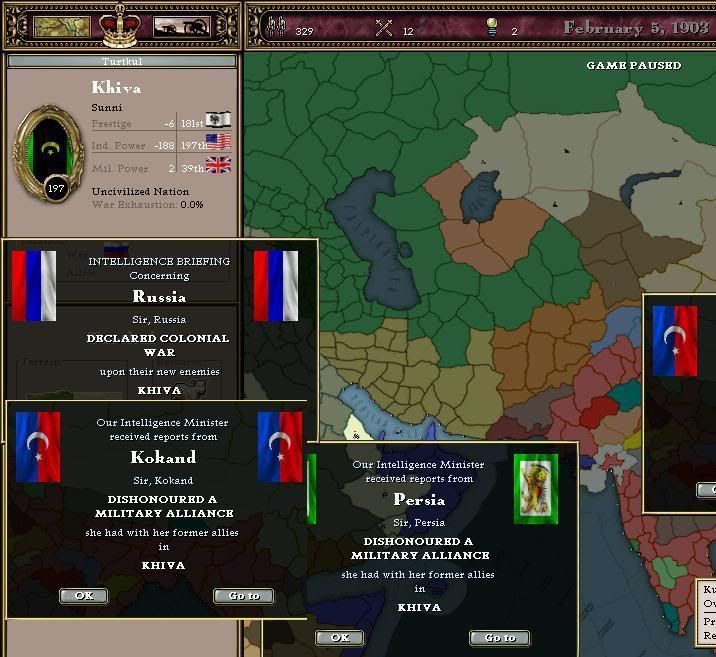
And then, where are all those soldiers going? In recent years, they have been going east and south – toward central Asia – where they have been taking over small countries and unorganized territories – Crimea, Khiva, Kokand, Bukhara, among others. When they attacked, and finally annexed Khiva earlier this year, I felt we had no choice but to conclude Russia’s aggression must be countered.
From The Eagle Rising: The Story of Prussia's Arrival On the World Stage, pub. 1989 by Professor Reinicke Herz
Following the disaster at Boston, the United States had withdrawn all but a holding force from the Hartford area to form part of a defensive line protecting New York from German attack. With Hartford laid bare, General Kreuzberg mounted an offensive that engaged on the 20th of May. By the 30th, the Americans had surrendered, and Germany came into control of Connecticut once more.
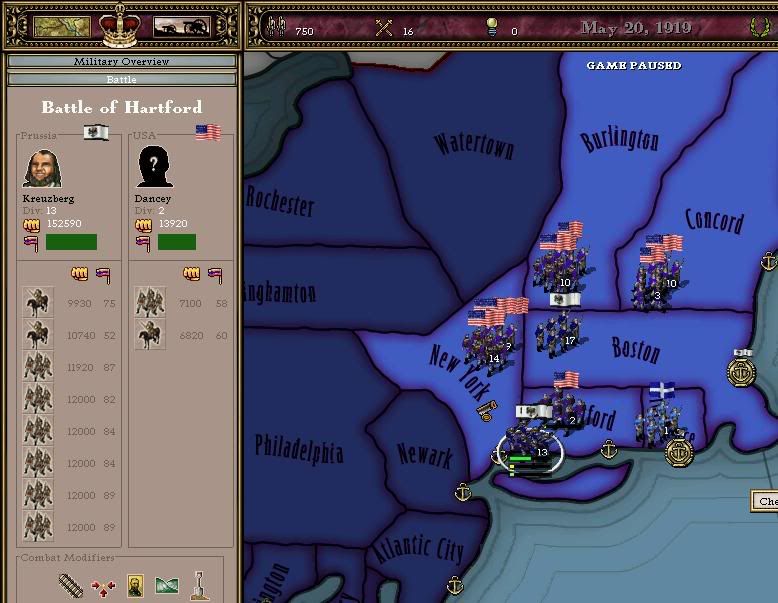
On 10 May, the German cruiser squadron encountered an American cruiser squadron. The exchanged fire left two German and three American light cruisers afire and sinking. But later, on 3 June, this same German cruiser task force (now down to 3 armored cruisers and a light cruiser) met two lone American cruisers – a light cruiser and an armored cruiser. Without loss to themselves, the Germans sunk the USS Boston and USS Memphis. The loss of Boston’s namesake served to further demoralize the American people.
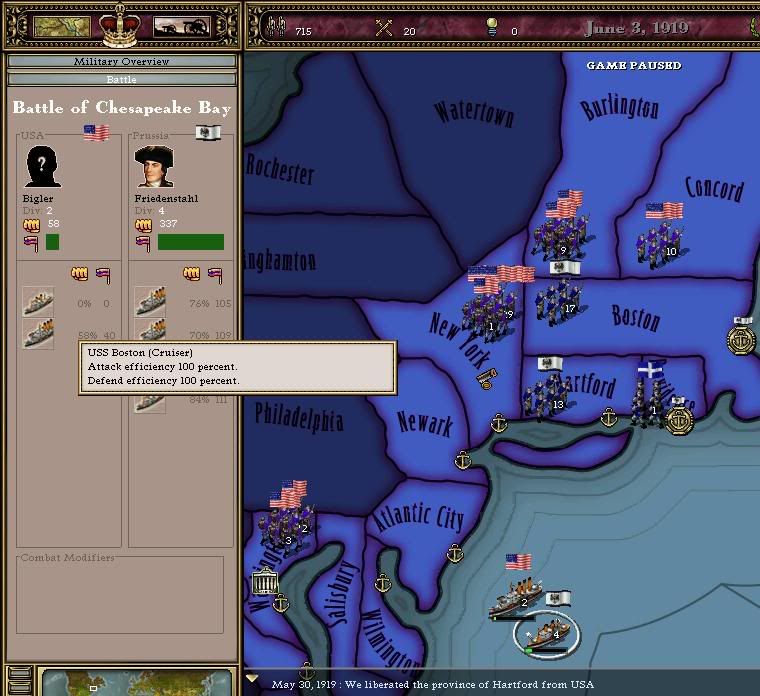
As part of an attempt to build the public spirit, the US Army initiated a strong attack against Hartford on the 4th of July, 1919. President Wilson announced the offensive in his Independence Day address. Meanwhile, General Kreuzberg made use of the diversion of forces to launch his own attack upon the defenses of upper New York State. Leaving Nienburg’s core corps of 188,000 entrenched soldiers to defend Massachusetts, Kreuzberg attacked on 9 July with 230,000 soldiers, supported by artillery and tanks.
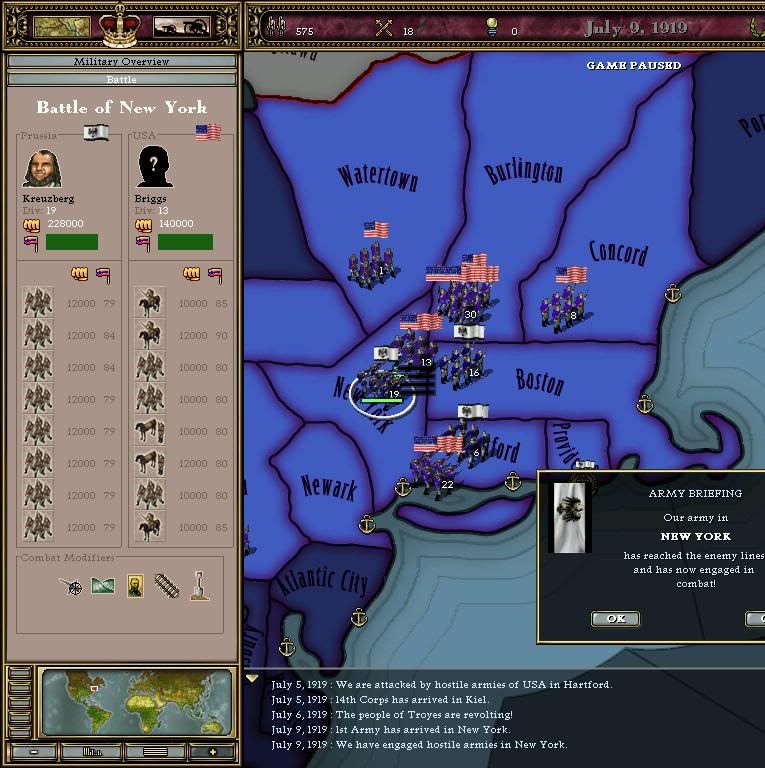
To some degree, the Americans were ready for this. They moved in additional divisions to absorb the attack, and began marching several divisions from Vermont to attack Kreuzberg’s flank. Sensing that the thrust into New York was in danger of becoming entrapped and destroyed, Nienburg called upon the only resource he could. General Gerhard Schwedt, grandson of the famous cavalry general of the First Anglo-Prussian War, had been placed in command of six divisions of cavalry. Among them were the Stendal and Stettin divisions – units with histories going back to his grandfather’s day, and with which Schwedt had served for 20 years. These cavalry divisions – the last of the Prussian cavalry tradition – were also some of the most experienced officers and men in the army. And they were the only units with enough speed to harass and delay the army from Vermont to prevent its deciding the battle against Kreuzberg.
Schwedt’s cavalry began nipping at the flanks of the American reinforcements on the 14th, and was able to delay and distract them such that they could not concentrate on their mission, which would have been very detrimental to the timing and success of Kreuzberg’s attack. The Americans would attempt to move – in a different direction, if necessary – and suddenly Schwedt’s cavalry was there. They would snipe from ridgelines, make sharp, stinging flank attacks, and then would be gone before the US cavalry could respond effectively. This went on for some days, albeit at certain cost to the Prussian horse troops.
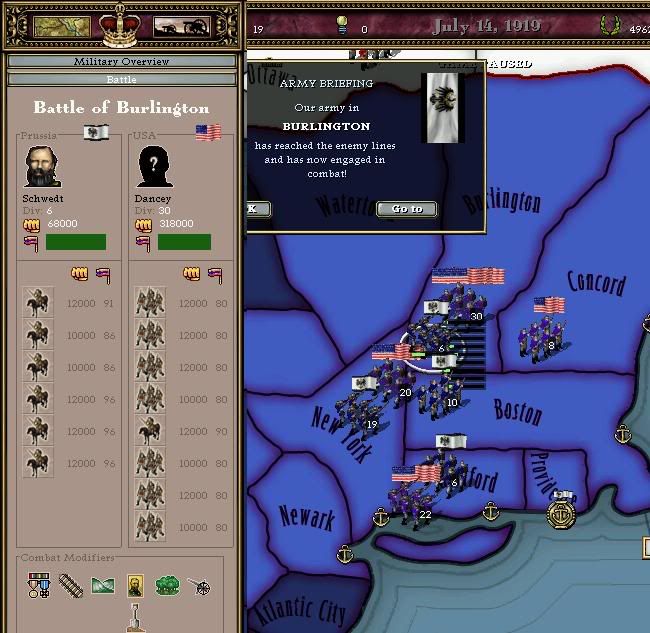
By the 18th, these three simultaneous battles – Hartford, New York and Burlington – were turning out in wildly different ways. The American attack upon Connecticut had cost 30,000 casualties of their own against only 2,000 German. Like in the Battle of Boston, they could not sustain that ratio for long.
Kreuzberg, relying heavily on the shock effect of his panzerwagens against the helpless infantry, hoped to punch through the American lines despite the fact that the reinforced American army outnumbered him.
And Schwedt, trying desperately to keep the northern corps from aiding against Kreuzberg, had already lost half of his cavalry to death or injury, despite the mobility which gave them an advantage against the vastly superior American strength. At that point, he was recalled to Boston, where he would then play a different but similar role in the evolving battle plan.
Nienburg, as the plan went, would leave his entrenchments and move forward to Kreuzberg’s aid with the reserved Hamburg PanzerKorps.
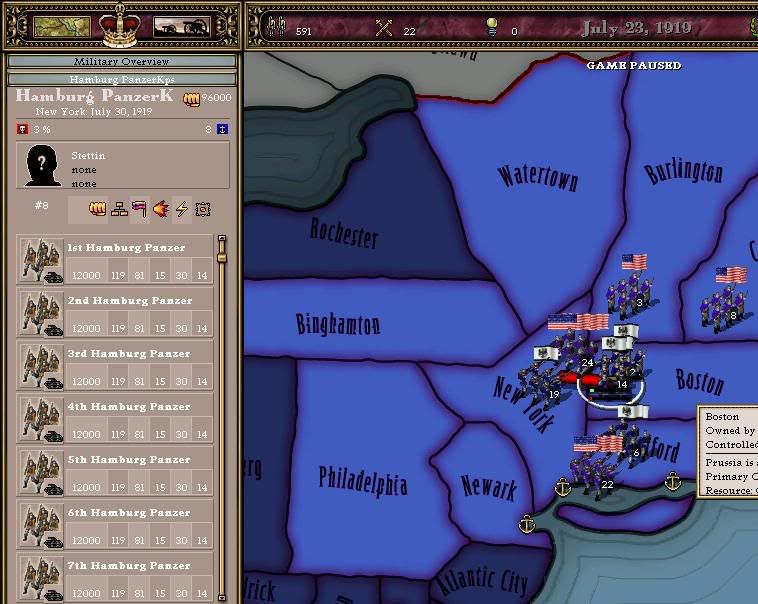
This is where the battle plan becomes immensely complicated. On the 27th, Kreuzberg disengaged his badly mauled divisions from the American lines and retreated back toward Boston. He met with Nienburg, coming the other way, they swapped commands, and Kreuzberg rolled forward with the Hamburg Panzers toward the US Army defensive lines he had just left.
General Schwedt, his exhausted divisons backfilled with spare horses and rapidly (and inadequately) trained infantry, rushed forward to keep the Americans under pressure long enough for Kreuzberg to arrive with his slow panzerwagens.
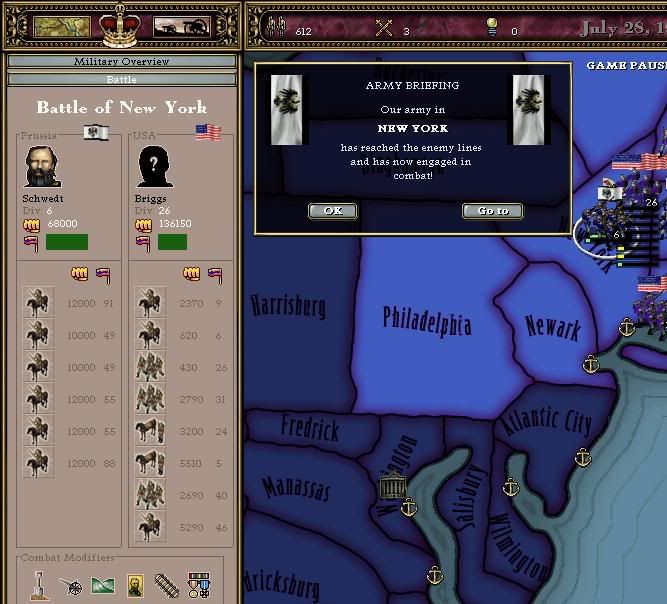
Finally, on 30 July, the Hamburger Panzers arrived. For the next week, Schwedt, Kreuzberg and Nienburg managed, as best they could, to maintain the pressure on the American lines in hopes that they would break – which history tells us they very nearly did, on several occasions. But just enough US Army divisions arrived on the front fresh and ready for combat to keep the line from collapsing. The offensive was taking a terrible toll on the cavalry, infantry and even panzer units involved on the German side. Each unit was rotated out when they were near their limit, and new units were brought back into the offensive as available.
On the 7th of August, the Hamburg PanzerKorps was pulled back, having suffered grievous losses against the Americans. Fresh German divisions had just arrived in Boston from overseas, and they were quickly prepared to go forth and become the next wave of this prolonged offensive.
However, on the 10th, General Nienburg made the difficult but obvious decision to relent, bring his battered corps back to Boston to regroup and recover, and consolidate the surviving soldiers with the reinforcements.
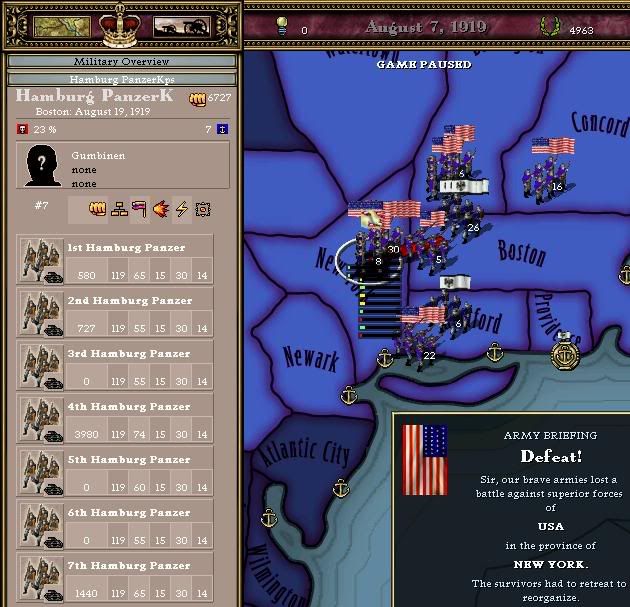
In hindsight, Nienburg’s position was not unenviable. Thanks to the reinforcements, the security of the New England perimeter was not in doubt. Ahe Americans had taken a horrible beating also, having many divisions ground under through constant contact with the enemy.
The Germans may have failed at their primary goal – a breakout from Boston – but they succeeded in a secondary goal of reducing the ability of the United States to resist the growing presence of the Germans on America’s shores. The day for another offensive would not be far off. Until then, it was time to rest.
Vincent Julien - One of the interesting things about history -- one of the things that most fascinates me -- is that there are multiple perspectives and worldviews that persist independently, each with their own bodies of evidence which can be debated and argued back and forth. It's often hard to say where "fact" lies and different things can be taken from the same evidence depending on your perspective. Now, I'm no relativist, but I do acknowledge that we cannot "know" fact with 100% certainty, so I'm willing to allow for other perspectives even while holding firmly to my own (but not stubbornly in the face of strong counter-evidence).
I mean, there are people who still disagree vehemently about whether Spock has emotions!And that's something fictional with a finite body of "evidence" -- but people still disagree, rationally, because they give different weight to different "evidence".
History is no different. I think some "academics" go far astray in insisting they are right and everybody else is wrong. Not only are there multiple sides, each saying they're right and everybody else is wrong. But each side often has good points which deserve to be considered. By insisting that one has "the right of it" one also shuts down discussion, which I think betrays the basic principles of the historical ideal, which is to question, and to re-evaluate based on new evidence (as you know, history is always changing!).
Anyway, for what it's worth, the audiobook I'm currently listening to -- by an "expert" of many decades in the field -- goes into length describing how Nazism was a "redistributive" (i.e. socialist) system, and that it was "far from being a tool of the capitalists". Next week I might read/listen to something completely opposed to this perspective. But I think it benefits me, as an experienced historian, to take in all these perspectives, and to consider the evidence.
As an American philosophical conservative (or libertarian/liberal, as you say in the other thread -- the meaning is the same, even if the definitions are not -- I stay the same, while the definitions change, which is oxymoronic), I see many influences of socialism in society and in history (and socialism is broadly enough defined to encompass various sub-philosophies). I think this perspective is underrepresented, so I present it here. No need to necessarily agree with me, but I think it's an idea worth considering. The discussion in the other thread seems to be leaning toward the term "corporatist" for the Nazis, which may well be a more accurate term/perspective. I don't know, as corporatism wasn't really taught/acknowledged when I was in school, so I'd need to learn more about it to see what fits.
Anyway... You'll see more of "my perspective" to come, so... enjoy!
And, naturally, I plan to enjoy your magnificent tome on the same subject -- "Prussian Moderation" -- from a different but worthy perspective, and with great talent and care spent in the crafting!
Rensslaer
